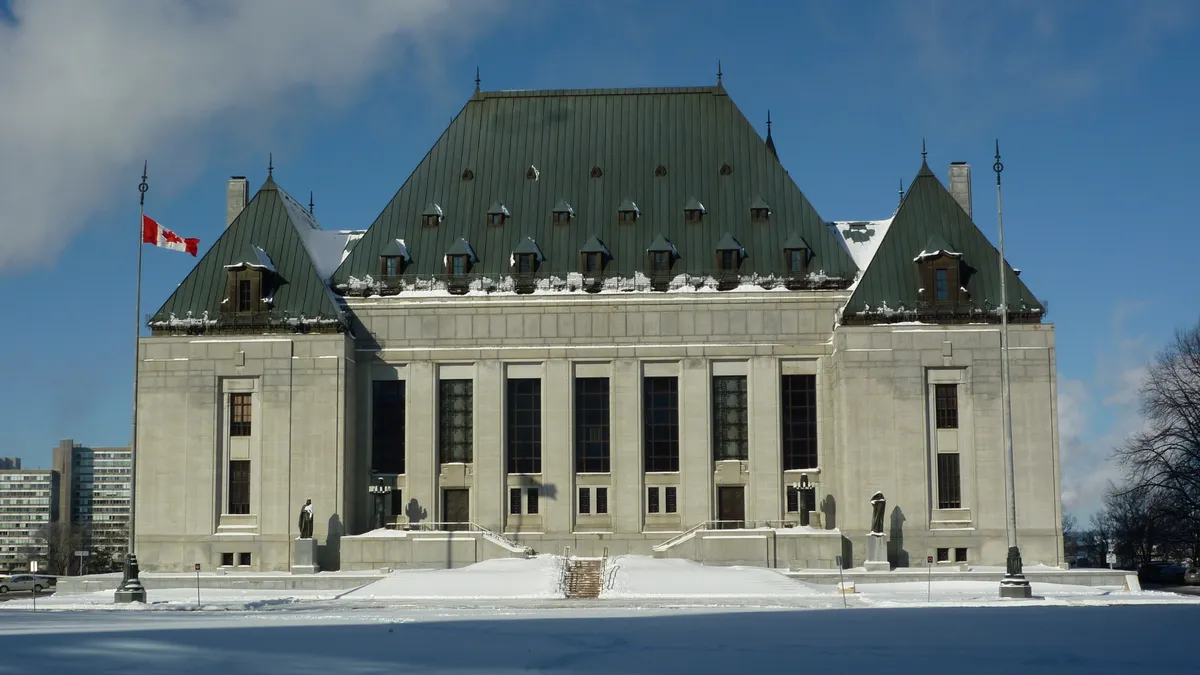Dive Brief:
- The Supreme Court of Canada upheld the country's federal carbon pricing law enacted in 2018 in a judgement rendered on Thursday.
- The 6-3 ruling found that the law fell within federal jurisdiction, due to it being "a regulatory charge" as opposed to a "carbon tax." The Alberta, Ontario and Saskatchewan governments argued that the regulation of greenhouse gas emissions was a provincial issue, as part of the control over natural resources.
- The law allows provinces to implement their own carbon pricing plans, but the federal government could apply its minimum pricing standards or backstop in the provinces that have not implemented the national system or their own systems. Currently, seven of 13 provinces and territories in Canada pay the "backstop" rate, currently priced at C$30 per ton of carbon dioxide emissions, which will increase to C$170 per ton by 2030.
Dive Insight:
Upholding Canada's carbon pricing law brings the importance of climate action to the fore.
"[A] provincial failure to act directly threatens Canada as a whole," Chief Justice Richard Wagner wrote in the judgement.
"The conversation in Canada has been stuck for far too long, the conversation needs to shift to action. What the Supreme Court of Canada really said is that the effort required to tackle climate change requires a collective effort," said Merren Smith, executive director of Clean Energy Canada, a program at Simon Fraser University.
The affirmation is also important as conservatives failed to agree in their recent caucus on the existence of man-made climate change, according to the federal policy director of the Pembina Institute, Isabelle Turcotte. The policy allows the country to move on with the last leg of decarbonization.
A number of provinces have over 90% zero emission electricity — mostly through hydroelectric and/or nuclear power — with electric utilities largely ran by the provinces.
Meanwhile, in the United States, carbon pricing ballot initiatives and legislative efforts have failed on state and federal levels, although the policy is viewed as critical to unlocking pathways for making certain technology more economic for the utility sector, such as carbon capture.
"Carbon pricing, while controversial, is really one of the most effective tools that we have to reduce emissions, a majority of the world's economists agree," said Smith.
Carbon pricing is also gaining traction in higher-emitting sectors. The American Petroleum Institute endorsed putting a price on carbon emissions as part of its wider new climate policy platform released Thursday.
The ruling was a political win for Canadian Prime Minister Justin Trudeau.
"There aren't really many next steps, our price is already implemented," said Moira Kelly, spokesperson for the Office of the Minister of Environment and Climate, Jonathan Wilkinson.
The conservative premiers who challenged the law will now have to respond.
Premier Scott Moe of Saskatchewan, who continues to oppose the plan as "bad environmental policy," said the province will "forge our own path without being subject to the punitive and ineffective carbon tax imposed by Prime Minister Trudeau and the federal government," in a statement on Twitter.
Whatever pricing system the province implements, the plan must be submitted for evaluation to the Office of the Minister of Environment and Climate, Kelly said.
"We're happy to work with the American administration if they want," Kelly said, adding that the Minister has met with U.S. Climate Envoy John Kerry last month.
"I think it would be good for Canada to work with the U.S. on policies to transform our transportation sectors... like zero emissions vehicles mandates and a clear date when we will phase out [internal combustion engine] cars," Smith said. The countries could also work together on a "buy-clean" policy, to promote cleaner emissions among heavy emitter industries, she said.
Canada has a number of other climate-related policies on deck, such as a Clean Fuel Standard that would come into effect in 2022 and make fuels producers blend lower emission fuels to make them cleaner-burning over time, according to Kelly.















